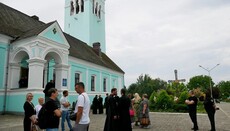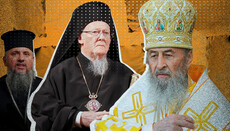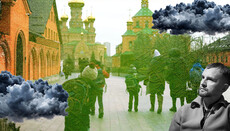Mother complex: what Church is the Mother for Ukraine
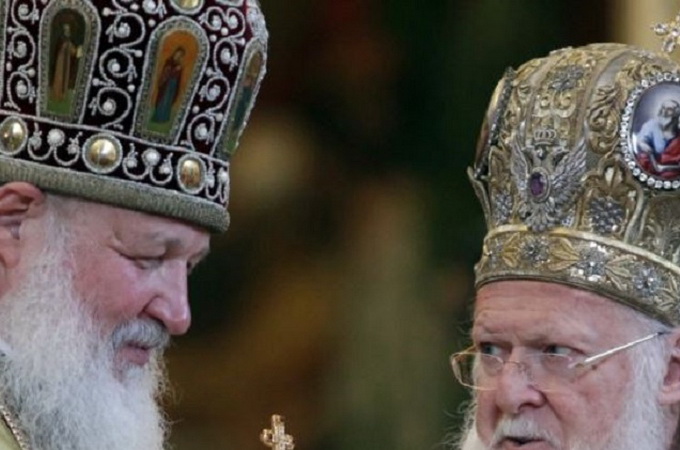
Its main messages are as follows:
- The role of journalists is to convey true information to people. This function demands great responsibility and may present many temptations.
- The spiritual relations that unite the Mother Church with Ukraine could never disappear. The Ukrainian people received the baptism into the Christian faith from Constantinople at the time of the Holy Great Prince Vladimir of Kiev, and, therefore, the Church of Constantinople remains forever the Mother Church of the Ukrainian people.
- We fervently pray for the spirit of unity. We pray for peace in Ukraine. We hope that there will be no divisions among brothers. Unity and peace are highly desired and essential for the people and the Church of Ukraine.
- The story of Saint Vladimir and his son Yaroslav should edify the Ukrainian people today. Their conversion to Christianity may have been for mainly political reasons, but, at its root, adoption of a state religion was intended to create the conditions of peace and stability so that culture and spiritual development could flourish. The same is true today.
If we cannot but disagree with points 1, 3 and 4, then point 2 causes bewilderment. Patriarch Bartholomew speaks about the ongoing spiritual relations between the Mother Church, i.e. the Patriarchate of Constantinople, on the one hand, and Ukraine with its people on the other. The Orthodox Church of Constantinople is declared the Mother Church for Ukraine and the Ukrainian nation because the Ukrainian people were baptized into the Christian faith from Constantinople.
However, history shows that during the time of Prince Vladimir, the Eastern Slavs who lived on the territory of the ancient Russian state were baptized. Their Christianization eventually led to the formation of a single Russian people, from which three political nations subsequently separated – Russian, Ukrainian and Belarusian. This finally happened in the twentieth century. Thus, either Ukraine as a country and a state, or the Ukrainian people as an ethnic community in the times of the Russian Princes Vladimir and Yaroslav did not exist. Therefore, it cannot be that the Church of Constantinople has been the Mother Church for the Ukrainian people since the baptism of Rus.
Ukraine and the Ukrainian people could definitely arise in the cultural and philosophical sense since the 19th century onwards, in the political same - only since the 20th century. At that time, as now, Ukraine was spiritually nourished by the Russian Orthodox Church. If we define the Mother Church for Ukraine, following the logic of Patriarch Bartholomew, then it needs to be called the Russian Orthodox Church. After all, Ukraine and the Ukrainian people were formed on its canonical territory and under its direct spiritual influence.
However, the very search for the Mother Church for Ukraine and its people looks very doubtful. After all, the formation of modern nations is directly connected with the process of secularization, that is, with the deviation of a significant part of society, its ruling elites from faith, with the emergence and spread of agnosticism, atheism, and non-traditional religious movements. The Church and religion in general acted as the main ethno-forming and state-forming factor only in the Middle Ages and lost this role in the New Age.
Thus, it is wrong to speak neither chronologically nor essentially about the Patriarchate of Constantinople as a spiritual Mother Church for Ukraine and the Ukrainian people. And in general, it is hardly correct to raise the question of the Mother Church for the whole people and the country in which the Church is officially separated from the state, and the school – from the Church, where there are a lot of infidels, Muslims and non-believers.
The controversial statements of Patriarch Bartholomew make it necessary to understand the concept of the Mother Church. First, it is necessary to understand that in the theological literature this concept is used in two basic senses – spiritual and canonical. Unfortunately, they are often confused – either intentionally or unknowingly.
In the spiritual sense, the Church is the Mother for all of Her believing children, whom She gave birth "from water and the Spirit" in the Sacrament of Baptism. Therefore, the Mother Church can be called as the whole Orthodox Church, as well as individual Local Orthodox Churches, in relation to each believer and entire nations turning to Christ. In this sense, the Patriarchate of Constantinople, baptizing Rus, can be considered the Mother Church for the Old Russian people and the entire Russian land.
In the canonical sense, the Mother Church is understood as the "Mother" (kiriarkhal) Church, i.e. the Local Church, which gives birth to another Church with a certain degree of self-governance – from limited autonomy to full autocephaly. The fact of birth is expressed in the adoption of a specific canonical (ecclesiastical official legal) act – tomos. Thanks to this act, the newborn Local Church receives all its essential properties – name, territorial boundaries, scope of authority (status).
Proceeding from this clear canonical logic, it is obvious that the Patriarchate of Constantinople is the Mother Church for the ancient Kiev Metropolis (988), for the Metropolises of Kiev and Moscow (1458, 1461), formed as a result of its division, for the autocephalous Russian Orthodox Church (since 1589) – with their official names, titles of heads, borders and authorities.
From its "mother" status in relation to the Kiev Metropolis, Constantinople refused in 1686, agreeing to its reassignment to the Moscow Patriarchate. The Russian Orthodox Church is the Mother Church for the Ukrainian Orthodox Church, since in 1990, in the person of Patriarch Alexy II, the latter was granted "independence and autonomy in government" – with its name, borders and status. This is an obvious canonical and historical fact. There is nothing to polemicize about.
In this regard, periodical statements of different theologians that the true Mother Church for the Ukrainian Orthodox Church is the Patriarchate of Constantinople, and not the Moscow Patriarchate, are not only canonically and historically incorrect, but also politically biased. This is done on “the issues of the day”, not for the purpose of clarifying the truth, but for the sake of achieving political influence.
So, in our opinion, it is generally incorrect to speak in a spiritual sense of the Mother Church towards the Ukrainian people, state or country, which were formed in the New and Modern times under the influence of secular political processes rather than under the direct influence of some Local Churches. During the period of global historical upheavals, Orthodox Local Churches frequently reacted to what was happening against their will, mostly suffering from what was happening, rather than determining the course of history.
From the canonical point of view, it is correct to speak about the Mother Church in relation to another Local Church that received a certain status of self-governance from it. Canonically, the Mother Church for the Ukrainian Orthodox Church is the Russian Orthodox Church and no one else.
0
0
If you notice an error, select the required text and press Ctrl+Enter or Submit an error to report it to the editors.
Read also

Bishop and secular justice
16 January 17:29
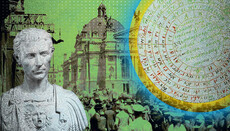
Why Lviv residents once defended “Muscovite” Christmas
15 January 13:55







